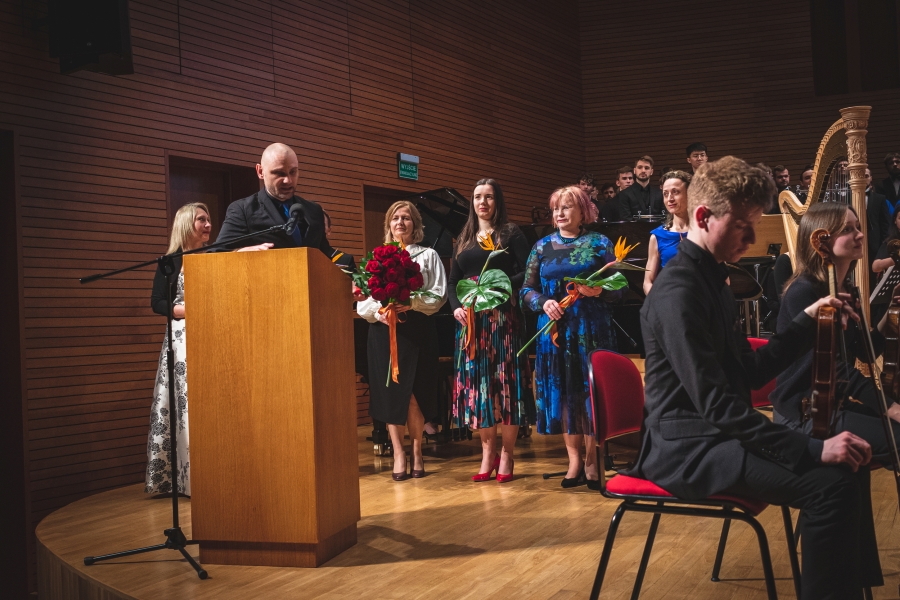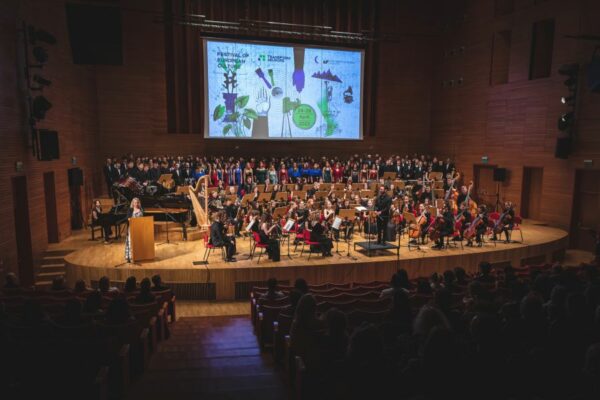RESEARCH EXCELLENCE INITIATIVE
FREEDOM OF RESEARCH – SCIENCE FOR THE FUTURE
‘Freedom of Research – Science for the Future’ series consists of articles, interviews and short videos presenting research conducted by the winners of the ‘Freedom of Research’ call for proposals
Adrian Robak, PhD, Assoc. Prof.
Anthem of the Transform4Europe
Three events within the European University Alliance took place at the University of Silesia between 24-28 April: T4EU Week, the Festival of European Culture and the PhD Conference. The University of Silesia yet again hosted representatives of the Transform4Europe partner universities. The most prominent event of the Festival was the Gala Concert at Karol Szymanowski Music Academy in Katowice. During the concert, the audience listened to the Anthem of the Transform4Europe premiere; the piece was composed by Adrian Robak, PhD, Assoc. Prof., from the USil Faculty of Arts and Educational Science. In an interview with the composer, we asked not only about the circumstances behind the Anthem’s creation but also about the contemporary skills of a person writing music today, about the nomination for this year’s Fryderyk Awards, and where music creators should start to discover classical music.

Adrian Robak, PhD, Assoc. Prof. | Photo by Tomasz Kiełkowski
Tomasz Płosa: Professor, the T4EU Gala Concert added splendour to T4EU Week at the University of Silesia. The concert featured the premiere of the Alliance’s anthem you are the author of. Could you tell us a bit about the background of composing it?
Prof. Adrian Robak The idea has been born within the ‘Freedom of Research’ call for proposals. We once spoke with Prof. Małgorzata Myśliwiec, the Coordinator of the Transform4Europe Alliance Office at the University of Silesia, and we decided that the programme of T4EU Week should also include artistic events, and not only those related to popular music. And so we have wondered what could be an identifying element for the Alliance’s participants; eventually, I have decided to write an anthem. I intended to write it so its individual fragments would have different emotionality and might become music material for promotional purposes of the University of Silesia and T4EU. And so I thought that it would be wise to make use of the ‘Freedom of Research’ programme; thus, we have created a piece on virtual instruments along with a virtual vocal part performed by the choir.
The piece itself is an attempt to reconcile contradictory values, to create a song of water and fire; at least, that’s what I feel. On the one hand, I’ve wanted to be faithful to the original choir tradition reaching at least the Middle Ages one could not depart from, and on the other hand, to preserve artistic freedom. Although, how to reconcile a good melody embedded in the tradition with some author’s touch, something original and close to me at the same time? I believe that I’ve managed to do that. When I was working on the composition, it was not yet certain it would be performed, but I wrote it bearing in mind a symphony orchestra and an extended mixed choir. The chances to perform the piece live were increasing over the course of time. Eventually, the day of its premiere has come on Wednesday, 25 April; and I am incredibly proud of it.
Music is one thing; for me, the crucial part was the lyrics, that is the poem Spiritus movens by Joanna Soćko, but created bearing in mind the T4EU Anthem and written in English. It was the real inspiration for me but also a challenge. The poem takes up the issue of the question we should have asked ourselves and the very word ‘question’ appears in many different languages, languages of countries of the Alliance’s partner universities. The lyrics contain a passage about change as a factor we cannot develop without. I hope that parts of the Anthem will serve as musical settings for various activities within the T4EU.
Tomasz Płosa: The number of people who appeared on the stage at the Academy of Music during the performance of your composition was impressive. Who could we see and hear among the performers?
Prof. Adrian Robak: Agata Hołdyk, PhD, came up with the idea to entrust the performance to the youth – Karol Szymanowski Youth Symphony Orchestra from the secondary-level National Music School located at Osiedle Tysiąclecia. It was conducted by Wojciech Wantulok. I appreciate their work even more since they have had only a few rehearsals with a 140-person choir consisting of: the ‘Harmonia’ Choir of the University of Silesia (conducted by Prof. Joanna Glenc), the Academic Choir of the Silesian University of Technology (conducted by Tomasz Giedwiełła), the mixed choir from the mentioned music school (conducted by Prof. Mirosława Knapik) and Sofia University Ensemble St. Kliment Ohridski (conducted by Krassimira Tsutsumanova), a T4EU partner university. Over 200 performers were on the stage! The instrumental layer of the Anthem is so complex—especially in the part of brass and woodwind instruments and the percussion—that it required such a large team. Live performance is always a precious lesson to the composer, and it was not otherwise on that Tuesday evening.
Tomasz Płosa: You have mentioned the ‘virtual’ version of the Anthem. I understand that nowadays, thanks to sample sounds of particular instruments, a composer can immediately check how the music they wrote sounds like. It seems that this technology helps composers significantly.
Prof. Adrian Robak: It does and does not. Virtual instruments are acoustic instruments recorded digitally. These digital samples are used to ‘create’ an instrument that imitates all articulation possibilities; for instance, in the case of the violin, it imitates playing with a bow or plucking the strings with fingers, and dynamic range, from the possibly quietest to the possibly loudest. All these parameters are transferred on the keyboard or the so-called workstation. Thanks to computers, we can take care of other music parameters, even the most intangible ones like expression, which will be different for each and every instrument.
Virtual instruments make it much easier to create electronic music that combines acoustic and synthetic sounds generated by the computer. They also come in handy in combination with software for score editing.
Nonetheless, the reception of music performed live by a real orchestra is much richer in sensations that the best sound system in the world fails to deliver. Live sound touches us; we feel it with our body, and not only with our hearing. The acoustic space plays an immensely significant role, too, because it reflects sound in a particular way and influences its reception. Interestingly, the acoustic of the room itself differs depending on the number of people in it. And there is the human factor as well since music is performed by living organisms. Virtual instruments cannot reflect the better or worse mood of a performer or that they have health problems at the time. And the beauty lies in the fact that people transfer their temporary state into the performed music. These factors cannot be reflected even by the most advanced virtual instruments.
Tomasz Płosa: This week is not only a premiere of the Anthem of the Transform4Europe but also the Fryderyk Awards in classical music. The statuettes will be given in eleven categories on Thursday, 27 April, at Mediateka – Concert Hall in Tychy. Your album Réflexions, released by DUX Recording Producers, has been nominated in the category of the Album of the Year – Contemporary Music. Congratulations!
Prof. Adrian Robak: Thank you. This nomination means a lot to me. Although I had not expected it, to the extent that half an hour after Łukasz Brzezina from DUX label called me and said that the album made it to the list of five nominees, I called him back just to make sure he was not mistaken. (laughs) It is great joy and a fantastic feeling to be recognised by the Polish Society of the Phonographic Industry; however, seeing the reactions and emotions of the listeners—and sometimes even performers—when they perform my music is what really matters to me. This is the greatest prize for me, as a composer.
I know and appreciate all the other authors nominated for the award, and the music of all the albums in this category is extremely diverse. I followed the track of using instruments associated with early music, most often baroque, in contemporary music. I really wanted them to resound a little differently, to unveil their other features. I also want to make it clear that Anna and Krzysztof Firlus, who play on the album Réflexions, are European-class musicians! Anna is an organist and harpsichordist, and Krzysztof plays the double bass (also in the Polish National Radio Symphony Orchestra in Katowice), the viola da gamba and the pardessus de viole. The origin of the last instrument is particularly interesting, which is very important in French-speaking countries: as the viola da gamba is held between the knees—and in the old days, women were not supposed to sit like that, it was considered inappropriate—a smaller version of the instrument was created – the pardessus de viole.
For me, it is a great pleasure to work with such great musicians, and for them, a refreshing change to perform pieces written in Renaissance or Baroque.
Tomasz Płosa: The Anthem of the Alliance was arranged on the symphonic orchestra, and tracks on the album Réflexions for a chamber group. Which composition is closer to you?
Prof. Adrian Robak: I do enjoy composing for the orchestra; I adore the timbre and dynamic possibilities provided by it. It is way harder for me to write music for smaller bands, it is always extremely challenging. And yet my next on this my composer’s path is writing a piece for an oboe quintet of the Polish National Radio Symphony Orchestra; it is to have its premiere this autumn.
Tomasz Płosa: Where do you search for inspiration to create new music? Which composers do you listen to the most?
Prof. Adrian Robak: Above all, I search for inspiration in literature and spending time in nature. Obviously, there is a group of composers whose output is special to me. My number one is Johann Sebastian Bach, whose music I have performed on keyboard instruments myself. Then some great stars: Mozart, 19th-century Gustav Mahler, Claude Debussy and Richard Strauss; when it comes to the turn of the 19th and 20th centuries; as for the last century, it would be Dmitri Shostakovich playing with the Stalinist regime. Apart from that, the Poles as well: Lutosławski, Penderecki, Górecki, Kilar and Paweł Szymański. My favourite film music composers are Ennio Morricone, John Williams, Alexandre Desplat and John Adams, who writes fabulous post-minimalistic pieces. In general, I do like minimalism represented by Phillip Glass, for instance. When it comes to the contemporary music creators working today, I remain—shall I say—artistically separated from them. (laughs) I do not mean I do not appreciate or root for them; on the contrary, I am really glad that many interesting creators work in Silesia.
Tomasz Płosa: Can we say that if anyone asks a question about where to start the dive into classical music, we may answer—as Zbigniew Wodecki said— ‘begin with Bach?’ [Zacznij od Bacha – a song by Z. Wodecki]
Prof. Adrian Robak: Very much so! Bach always works! Although one has to remember that his work is polyphony, which requires some theoretical knowledge. Surely, a course in music history would not hurt anyone who would like to take a deep dive into these issues; but the number of diverse styles, genres and forms is so vast that even without it, everyone can find something to charm and delight you. And if ‘begin with Bach’ will not do, maybe ‘begin with Mozart’ will do the trick.

Gala Concert at Karol Szymanowski Music Academy in Katowice | Photo by Tomasz Kiełkowski





